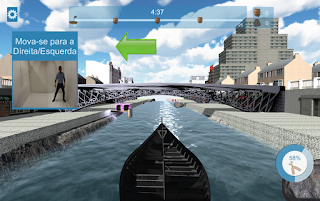Portuguese Tradition Inspired Exergames for Older People - Strategic Tools to Promote Functional Fitness
Populations are becoming older in developed
countries with the low birth rates and increased life
expectancy. A third of the European population is
estimated to be over 65 by 2060 (European
Commission, Economic and Financial Affairs,
2012). At the same time, sedentary lifestyles are the
4th mortality factor worldwide (World Health
Organization).
Exergames, exercise video games, have been
under research as an application of technology that
can help older adults to keep physically active
independently, having impact in both physical and
cognitive functions (Anderson-Hanley et al., 2012;
Molina et al., 2014). In this paper, we summarize a
set of four exergames for older people that are
designed to provide functional fitness training and
can be deployed in a senior gymnasium.
Methods
 To produce exergames that would have a positive
and significant physical impact in our players’ life,
we started by grounding them on health
requirements. From the Senior Fitness Test
framework (Rikli and Jones, 2013), we identified the
most relevant dimensions to be trained as: motor
ability (balance, agility and flexibility), aerobic
endurance and muscular strength (lower and upper
limbs, and trunk). A set of exercises to be
incorporated in the games was developed by sport
science professionals based on these dimensions.
The technical setup of our exergames has a Kinect V2 camera is set in front
of the user to capture his/her motion and serve as
game controller. A projector is pointed to the floor
to act as display.
Through several brainstorming sessions, we
chose to develop the games under the umbrella
scenario of a national tour of Portugal, where each
game would replicate characteristics of individual
regional traditions. Three elements - health
requirements, technological setup, and scenario -
were used as foundation and a development game
jam was organized. This included the participation
of three videogame designers, three graphical artists,
two psychologists, two sport science professionals,
five programmers and three games for health
experts. A set of four game prototypes were
developed. These were tested to collect qualitative
feedback on what to improve in the prototypes with
nine users (8 females; age: M=62.3, SD=6.2) and
two trainers of an elderly gym. This feedback was
analysed and integrated into the final version of our
exergames.
To produce exergames that would have a positive
and significant physical impact in our players’ life,
we started by grounding them on health
requirements. From the Senior Fitness Test
framework (Rikli and Jones, 2013), we identified the
most relevant dimensions to be trained as: motor
ability (balance, agility and flexibility), aerobic
endurance and muscular strength (lower and upper
limbs, and trunk). A set of exercises to be
incorporated in the games was developed by sport
science professionals based on these dimensions.
The technical setup of our exergames has a Kinect V2 camera is set in front
of the user to capture his/her motion and serve as
game controller. A projector is pointed to the floor
to act as display.
Through several brainstorming sessions, we
chose to develop the games under the umbrella
scenario of a national tour of Portugal, where each
game would replicate characteristics of individual
regional traditions. Three elements - health
requirements, technological setup, and scenario -
were used as foundation and a development game
jam was organized. This included the participation
of three videogame designers, three graphical artists,
two psychologists, two sport science professionals,
five programmers and three games for health
experts. A set of four game prototypes were
developed. These were tested to collect qualitative
feedback on what to improve in the prototypes with
nine users (8 females; age: M=62.3, SD=6.2) and
two trainers of an elderly gym. This feedback was
analysed and integrated into the final version of our
exergames.


Comments